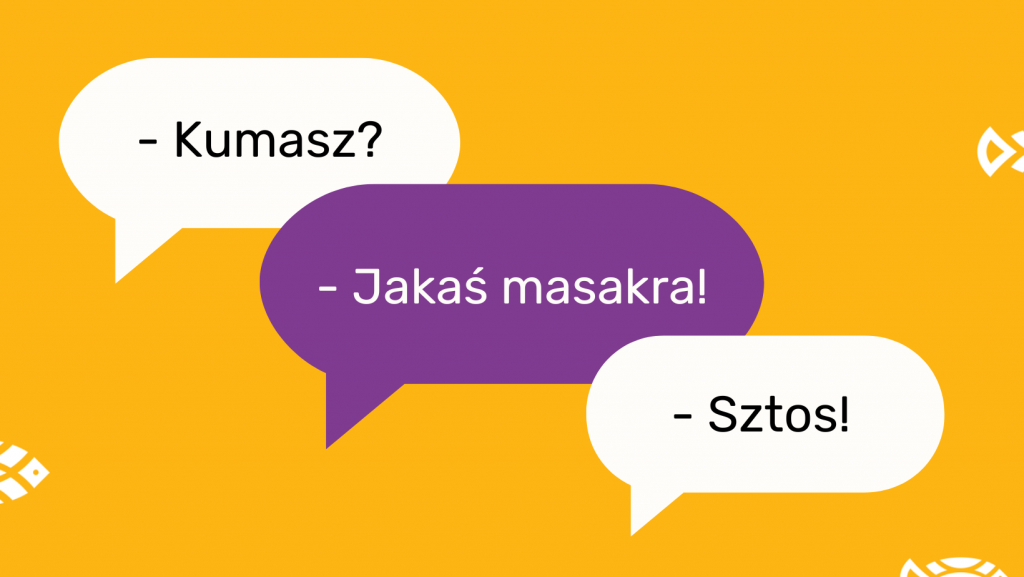Polish Slang! Part 1.
November 20, 2023 2023-11-20 9:52Polish Slang! Part 1.
Polish Slang! Part 1.
Today, we’ll delve into one of the most fascinating areas of the Polish language – slang. This colorful, expressive language, filled with vivid terms and phrases, undoubtedly adds a unique flavor to our everyday conversations. For those of you learning Polish, getting acquainted with some of these expressions can be highly beneficial during conversations with native Poles.

Why is it worth learning Polish slang?
Language skill development
Getting to know the diversity of colloquial language will enrich your vocabulary and assist in more relaxed communication. Understanding slang facilitates comprehension in less formal situations, like social gatherings.
Boost your self-confidence
The more we know about the Polish language, the more confident we feel in our interactions with Poles.
Integration with Polish society
Familiarity with slang aids in deeper and faster integration into Polish society. It helps to understand Polish customs, culture, and the sense of humor.
Building bonds
Using slang expressions can help break the ice and build closer bonds.
6 best Polish slang words!

1. Sztos
Sztos – a word meaning something fantastic, amazing, extraordinary, cool. For instance:
- Te zdjęcia są sztosowe, naprawdę świetna sesja. Gratuluję! (These photos are fantastic, a truly great session. Congratulations! )
- Ta impreza była totalnym sztos, bawiliśmy się świetnie! (That party was a blast, we had a great time!)
- Restauracja japońska ”Manami” serwuje sztosowe jedzenie, polecam spróbować! (The Japanese restaurant “Manami” serves fantastic food, I recommend trying it!)
2. Kumać
Kumać – means to understand, to know. For example:
- Czy kumasz, o co mi chodzi? (Do you understand what I mean?)
- Niczego nie kumam.(I don’t understand anything.)
3. Hajs
Hajs – another word for money. Usage examples:
- Byłem przez rok w Norwegii i zarobiłem sporo hajsu! (I’ve been in Norway for a year and earned quite a lot of money!)
- Muszę znaleźć bankomat, żeby wypłacić trochę hajsu. (I need to find an ATM to withdraw some cash.)
- Ta praca na pewno przyniesie mi więcej hajsu niż poprzednia. (This job will definitely bring me more money than the previous one.)
4. Ściema
Ściema – an expression indicating fraud, something untrue, false, or a lie.
- Wszystko, co mówi, to jest ściema. Nie można jej ufać. (Everything she says is a lie. You can’t trust her.)
- Jego obietnice to ściema, nie zrealizuje tego. (His promises are a lie, he won’t fulfill them.)
5. Masakra
Masakra – used to describe something very bad, chaotic, tragic, or terrifying.
- Ten film był naprawdę masakrą, nie dało się go obejrzeć. (That movie was a real disaster, it was unwatchable.)
- Ruch uliczny w mieście w godzinach szczytu to kompletna masakra! (Traffic in the city during rush hour is a complete disaster!)
- To, co się stało na koncercie, to była masakra. Ludzie byli przerażeni. (What happened at the concert was terrible. People were terrified.)
6. Suchar
Suchar – an unfunny joke, bad joke.
- Ojciec próbował opowiedzieć dowcip, ale to był taki suchar, że wszyscy tylko patrzyli w podłogę.(Dad tried to tell a joke, but it was so bad that everyone just looked at the floor.)
- Usłyszałem dziś takiego suchara, że aż zaniemówiłem. (I heard such a bad joke today, it left me speechless.)
Slang is a fascinating aspect of the Polish language that adds color to everyday conversations. Remember to use these expressions with a sense of context and situation, but also have fun with them!
If you want to learn more slang words and phrases, follow our blog! And for more free Polish lessons, follow us onInstagram!


